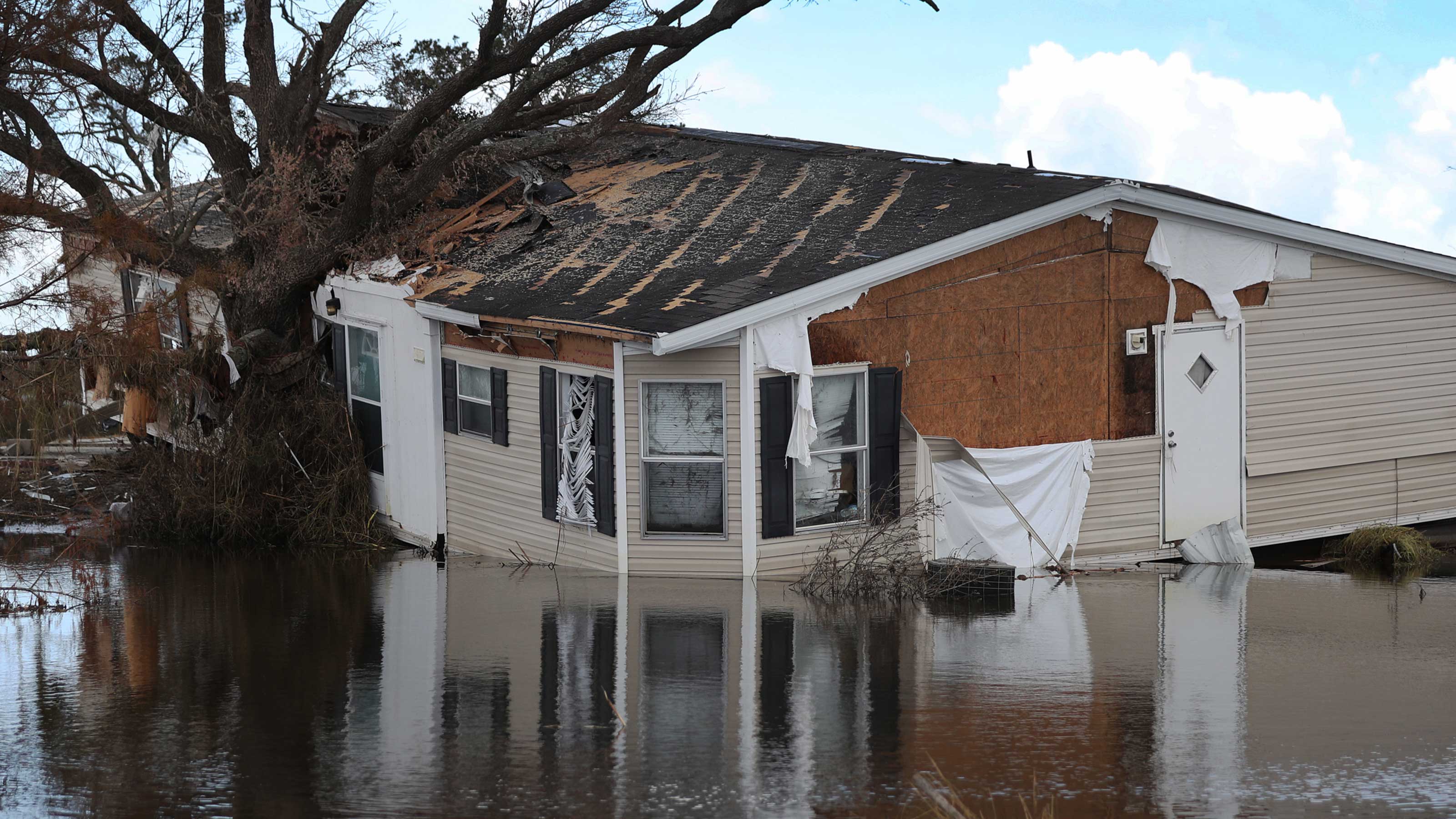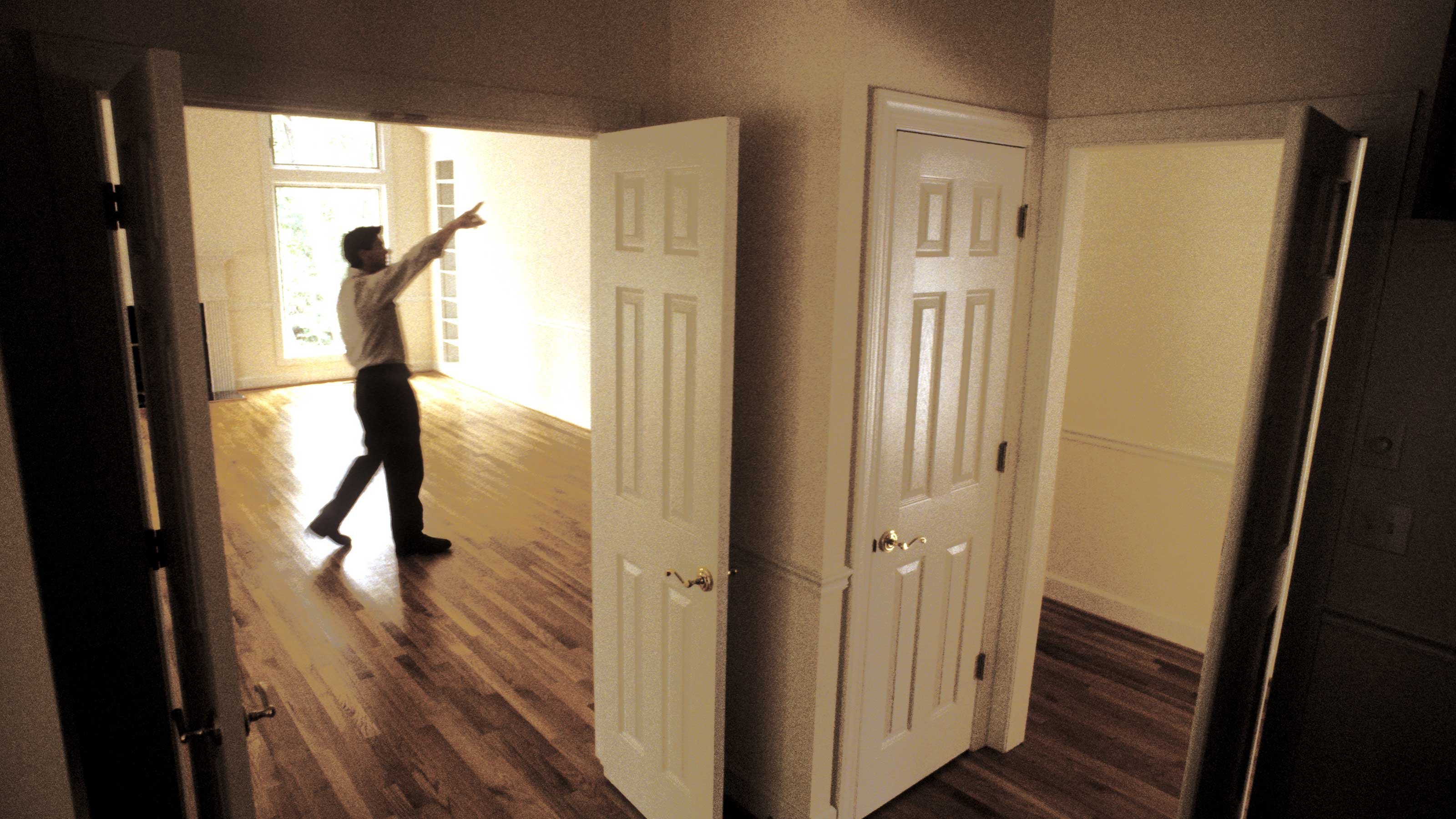Should You Buy or Rent a Home?
Zillow's economic research director Skylar Olsen joins our hosts Sandy Block and Ryan Ermey to discuss what factors to consider when deciding to buy or rent a home. Also, the pair offers money-smart travel tips to help you save.

Profit and prosper with the best of Kiplinger's advice on investing, taxes, retirement, personal finance and much more. Delivered daily. Enter your email in the box and click Sign Me Up.
You are now subscribed
Your newsletter sign-up was successful
Want to add more newsletters?

Delivered daily
Kiplinger Today
Profit and prosper with the best of Kiplinger's advice on investing, taxes, retirement, personal finance and much more delivered daily. Smart money moves start here.

Sent five days a week
Kiplinger A Step Ahead
Get practical help to make better financial decisions in your everyday life, from spending to savings on top deals.

Delivered daily
Kiplinger Closing Bell
Get today's biggest financial and investing headlines delivered to your inbox every day the U.S. stock market is open.

Sent twice a week
Kiplinger Adviser Intel
Financial pros across the country share best practices and fresh tactics to preserve and grow your wealth.

Delivered weekly
Kiplinger Tax Tips
Trim your federal and state tax bills with practical tax-planning and tax-cutting strategies.

Sent twice a week
Kiplinger Retirement Tips
Your twice-a-week guide to planning and enjoying a financially secure and richly rewarding retirement

Sent bimonthly.
Kiplinger Adviser Angle
Insights for advisers, wealth managers and other financial professionals.

Sent twice a week
Kiplinger Investing Weekly
Your twice-a-week roundup of promising stocks, funds, companies and industries you should consider, ones you should avoid, and why.

Sent weekly for six weeks
Kiplinger Invest for Retirement
Your step-by-step six-part series on how to invest for retirement, from devising a successful strategy to exactly which investments to choose.
Ryan Ermey: When it comes to homes, is it better to rent or buy? People get pretty dogmatic about this, but the truth is it depends on a number of factors. Zillow's economic research director Skylar Olsen breaks it all down in our main segment.
- Episode Length: 00:29:56
- Links and resources mentioned in this episode
- SUBSCRIBE: Apple Google Play Spotify Overcast RSS
Ryan Ermey: On today's show Sandy and I give you money-smart vacation ideas for the year ahead. And Dwayne "The Rock" Johnson makes an appearance in a new edition of Wild Pitches.
Ryan Ermey: That's all ahead on this episode of Your Money's Worth. Stick around.
From just $107.88 $24.99 for Kiplinger Personal Finance
Become a smarter, better informed investor. Subscribe from just $107.88 $24.99, plus get up to 4 Special Issues

Sign up for Kiplinger’s Free Newsletters
Profit and prosper with the best of expert advice on investing, taxes, retirement, personal finance and more - straight to your e-mail.
Profit and prosper with the best of expert advice - straight to your e-mail.
Ryan Ermey: Welcome to Your Money's Worth. I'm Kiplinger's associate editor Ryan Ermey joined as always by senior editor Sandy Block. Sandy, how are you?
Sandy Block: I'm good. Ready for a get away, Ryan!
Ryan Ermey: Yeah, me too and I think it could be because the weather here in Washington D.C., this past week, we had like two or three days of unseasonably warm...
Sandy Block: T-shirt weather, yeah.
Ryan Ermey: ... and lovely weather in the middle of what has otherwise been a pretty dreary winter. Which just, makes you itch to...
Sandy Block: Get out! Get out!
Ryan Ermey: ... get out of here. And it just so happens that we have a piece right in front of the book in the February issue of Kiplinger's Personal Finance on great travel deals that have been arising and that look to hold in 2020.
Ryan Ermey: One of the things that our colleague Kaitlin Pitsker mentions in the piece is that prices on flights to Europe are coming down thanks to competition among carriers and carriers additional routes. The example that she sites in the piece is that flights to Rome from Boston, New York, San Francisco are all trending around $300 to $350, and that's something we expect to continue throughout the year.
Sandy Block: The other thing that Kaitlin mentions is that the dollar has been strong to a lot of other currencies, particularly the pound thanks to Brexit -- and maybe Meg-xit. I don't know if that's a currency for sure or not. Who knows?
Ryan Ermey: That would actually pump up the value of Canadian currency.
Sandy Block: Yeah, but it's not good Britain, sorry the UK. So that has made the UK a better deal. It's usually a pretty expensive destination. And one place that Kaitlin calls out in particular that you can get good packages is Scotland and I think that sounds really intriguing and interesting right now.
Ryan Ermey: Yeah, especially for those of us who like to golf. Have you been to the UK before? Have you traveled there before?
Sandy Block: I've been to Ireland.
Ryan Ermey: But they're on the Euro.
Sandy Block: Right, they're on the Euro. Even a couple of years ago you could definitely benefit ... you could see the difference. You got a pump up from the dollar strength.
Ryan Ermey: I went to the UK in 2011, I went to London, and at this point it was like two to one, the pound to the dollar. It was like I was getting clobbered everywhere. You couldn't find a lunch for less than 11 pounds and you're just like, "Oh my God!"...
Sandy Block: That's like $20!
Ryan Ermey: ... I'm going to starve." I ended up eating French, pre-made mayonnaise sandwiches every day.
Sandy Block: It really does make a difference and it's worth checking out as you plan your trips. But we expect the dollar to remain pretty strong through 2020, so that's going to help you pretty much wherever you go.
Sandy Block: She mentioned some other places in Italy. Maybe a little off the radar places. Your cappuccinos, your paninis and things, they're not going to cost as much as they did when the dollar was weaker.
Ryan Ermey: Yeah. She recommends Sicily, which is supposed to be absolutely beautiful.
Ryan Ermey: One of the other interesting things, and this is something from back in my calendar days that I know as a trick, is that if you travel ... If it's an Olympic year, which 2020 is, it pays to travel to the Olympics destination after the games.
Sandy Block: After everybody's gone home. Yeah.
Ryan Ermey: A couple of weeks right after the games. So Tokyo, if you'd like to go in August, tons of new hotels have been built to house tourists for the games and they're going to be empty. So you can expect discounts of up to 50% after all of those athletes head home. And because there's going to be added routes to Tokyo, there should be reactively inexpensive airfare to get there as well.
Sandy Block: And finally, if you're looking for some warm weather, which I definitely am...
Ryan Ermey: Which we are right now.
Sandy Block: ... Yeah, we are right now 'cause the weather this weekend is supposed to be pretty crummy. Kaitlin has pointed out that Southwest has added some routes to Hawaii from the west coast. So you can get flights for $400 to $500. Now that's just from L.A. or San Francisco, but I know and probably you too Ryan, that if you plan it right, you can get flights from the east coast to L.A. or San Francisco for pretty...
Ryan Ermey: Relatively cheap, as well.
Sandy Block: ... reactively cheaply, too. So you put those two together, you get to Hawaii. Then once you get to Hawaii there's a lot of competition for the inter-island flights. You can hop from one island to another for $29 or something like that. So, Hawaii is not cheap and you're not getting any currency breaks because as some people seem to forget, it is still part of the U.S., but getting there is a lot less expensive. It is a wonderful place to visit. I've been there many times.
Ryan Ermey: So how do you find the flights? We've recommended using Google Flights and Google has actually just revamped their whole travel suite. We should actually ... We should find someone maybe to talk about the...
Sandy Block: That'd be good. Yeah.
Ryan Ermey: Maybe we'll just do it ourselves after we get a chance to test drive it a little bit. It's pretty new, like in the last week.
Ryan Ermey: In the meantime, there's plenty of services that offer awards, newsletters, when it comes to cheap flights as long as you're willing to be sort of flexible about when you want to travel. One is Scott's Cheap Flights and long-time listeners will remember that we talked to Scott. If you haven't listened to that episode, go back and check it out. It's about strategies for finding cheap airfares. But if you don't want to do it yourself, Scott has an email newsletter, comes right to your inbox, alerts you to cheap flights. If you want to pay for the premium it tells you about cheap flights coming out of your home airports.
Ryan Ermey: Kaitlin also mentions Airfare Watchdog, Secret Flying which provides ... I mean, these are two different ... I made it sound like it's one thing. Airfare Watchdog sends out daily emails with lists of fares. Secret Flying provides instant alerts on flight deals that depart from cities across the U.S. for people who download it's app.
Ryan Ermey: So we will link this entire story in the show notes. We will also be having a story, Sandy, in...
Sandy Block: In March, we've got a whole package on travel tips. Or, travel secrets...
Ryan Ermey: Secrets.
Sandy Block: Excuse me. Yeah, travel secrets, which won't be secrets anymore after you get your March issue. Keep an eye out for that because that's got not just flying, but how to get deals on lodging, rail, even road trips. So kind of a birds eye view of all the different ways you can save money getting out of town.
Ryan Ermey: All right. Stay tuned folks.
Ryan Ermey: Coming up we talk to Skylar Olsen about renting versus buying, the 2020 housing outlook, millennial home buying and more. Don't go anywhere.
Ryan Ermey: We are back and we are here with Skylar Olsen, the director of economic research for Zillow, and today we're talking about a thing that really comes up frequently when it comes to personal finance discussions. And that is the dilemma between renting or buying.
Ryan Ermey: Skylar, thank you so much for coming on.
Skylar Olsen: Yeah, thank you for having me.
Ryan Ermey: So I guess I'll just start with sort of a broad question here and that is, what's the main thing that people should think about when deciding whether to rent or buy?
Skylar Olsen: Yeah I mean, what it really comes down to if you're thinking about renting or buying a home is ultimately how long you're going to be there. We all have pretty good intuition about if I'm only going to be there for six months, certainly just rent it because buying a home comes with a lot of up front costs. And if I'm going to be there for 10 years, obviously I would want to buy that home. It's in between where things get a little bit less clear.
Sandy Block: Skylar, we know that Zillow has a calculator that people can use, and we'll link to this in our show notes, and one of the things it does ask for is how long do you plan to be there. But what other kind of information do you need to have at hand to get the most out of this calculator and get kind of the most accurate results?
Skylar Olsen: Yeah, absolutely. So, first lets just talk in general what you're ultimately looking at here when you're looking at this kind of question. If you're thinking about ... You got to make it apples to apples, in other words.
Skylar Olsen: So when we're thinking about the rent versus buy question, what we're ultimately saying is, "I'm going to buy a house, I'm going to use it for my primary residence, and it's going to double up as an investment asset, right?" Part of that payment ... That monthly payment every month as well as, of course, that big chunk, that original down-payment, it's going to appreciate over time.
Skylar Olsen: So if I'm thinking about renting, I'm going to do the exact same thing. I'm going to consume my primary residence, I'm going to pay my rent over time, and I'm going to take whatever would've been my down payment, I'm going to put it in stocks and bonds, and I'm going to have an investment vehicle that way as well.
Skylar Olsen: That makes the two decisions match up, so when I go to a calculator what I want to be able to put in is what's really going to impact that timeline. So how long is it going to take for the costs of renting to finally accumulate enough, that rent paid every single month accumulates over time, and overcomes those up front costs of buying a home in the first place.
Skylar Olsen: So those big, big ... those things that will really change in that time horizon is going to be the price point of the home you're looking to buy relative to the price point you're renting at; what you're comfortable with.
Skylar Olsen: So that price point issue is really huge, but so is your mortgage rate right? 'Cause that's your advantage in leveraging this asset, it's a leveraged investment... I get, all this equity growth on my full value of my house, but I only have to kind of pay the interest rate in terms of the cost to me on a smaller amount. So I don't own the whole amount of the house at one time, but I get all of this equity growth.
Skylar Olsen: And then the other ... So the mortgage rate really, really, really, really matters to the investment vehicle aspect of it. That's going to depend on my credit score and things like that, so I might want to go check out a mortgage rate estimator first, so I can plug that in at that time.
Skylar Olsen: And then also what's going to be assumed in that rent versus buy calculator, and this is the part that's pretty ambiguous but pretty crucial, is what kind of rate you would earn on whatever you'd be investing in when you're renting your house. A lot of calculators will assume some sort of normal. And I guess I would recommend to people to choose something a little bit conservative, 7%/8%, but to choose something because if you're not doing anything as a renter, if you're just leaving it in your checking account that makes buying look a whole lot better for you because it's going to force you to invest over time.
Ryan Ermey: So is that calculus going to change? 'Cause I live in Washington, D.C., where rents are... if you live in a high cost area, does the calculation change at all in one direction or the other?
Skylar Olsen: Oh absolutely. Absolutely. Absolutely. And one of the ways to kind of think about this is, so you've really got to play... maybe the way to think about this truly is, you really have to play with these calculators and you've got to run your numbers for your personal situation.
Skylar Olsen: And the reason why I say that is, I can be in an area and I can know because it's the public discourse these days that rent is crazy expensive. It's really challenging affordability. Now I can be in that kind of situation and it could be, still, a good idea to rent because over the same period of time ... yes rent feels really expensive, it's grown over time. In some areas due to population growth driven by high earning fields, great job growth in urban areas, for sale prices might have grown even more. In many of the U.S.'s housing markets, those prices ... that big old chunk, is kind of as high as it's ever been right now. So that can also really, really change the picture for you.
Skylar Olsen: Now remember, it's not just this price to rent ratio, that will matter a lot to how long it'll take the costs of renting to finally overwhelm and accumulate above and beyond the cost of owning that home in the first place. That certainly matters, but it's also what we expect home values to do.
Skylar Olsen: In those same high cost places where maybe rent feels high, but home value growth has been significant over the past several years, those places are now starting to grow much more slowly. So if I'm in San Francisco, for example, or San Jose, I'm in a market that's ... Sure the rent feels very expensive, the down payments are also expensive though, and home values are not expected to grow very fast over the next year. We expect those expensive coastal markets to be moving a little bit more slowly.
Sandy Block: I noticed, Skylar, when I was playing around with the calculator that in places like the Bay Area, you need to live in the house a lot longer than you would maybe in Akron, Ohio for the buy to beat the rent.
Skylar Olsen: Oh yeah. Oh yeah.
Sandy Block: For the buy to overcome the rent. 'Cause you just have ... As you said, you need that much more time to overcome sort of your initial nut.
Skylar Olsen: Oh yeah. It could be over a decade in some really expensive places where those prices, that housing market, has been so starved of inventory, that it is just ... it is more expensive than it has ever been.
Skylar Olsen: By that I mean, beyond those pre recession housing bubbles. Remember when we talked about that?
Sandy Block: Mm-hmm.
Skylar Olsen: More expensive than that. So that's what we're talking about here in some places. Yeah, absolutely.
Ryan Ermey: So looking out into the year ahead, into 2020, what would you say is sort of the outlook if I'm someone who might be looking to buy a home? It sounds like there's going to be pockets where ... Some places are going to look different than others.
Skylar Olsen: Absolutely. Yeah. Yeah. There are places in this country where we do expect home value growth, and sure things are slowing down than maybe the previous two years where we were really hitting some aggressive records in terms of how fast home values were moving.
Skylar Olsen: But there are places that still offer affordability. They are still offering that kind of growth. Those are places like your Charlotte, North Carolina's. Your Indianapolis, actually. These are all places where home value growth will help you build equity to overcome those upfront costs faster than otherwise. Whereas buying can be a little bit more of a no brainer.
Skylar Olsen: Hey, something before I forget that I kind of want to mention is, let's say you put all of your numbers into the calculator and you think, "Oh, I'm going to be here for four years." And what the calculator tells you is that buying your home is still going to cost you more after four years than having rented it?
Skylar Olsen: Depending on what you put in the calculator, let's say you put your current rent in your small apartment building and you were proposing that where you would buy would be a two bedroom home, right? You got to consider the fact that that place where you would be buying would probably provide you a different lifestyle, more amenities. It might be worth that cost.
Skylar Olsen: So what a lot of those calculators do is they turn it into a purely financial decision. You will buy for lots of different reasons, not just the dollars and cents of it. This is your primary residence, right?
Ryan Ermey: Yeah.
Skylar Olsen: So it's also access to the schools you want. It's having control over your home. Having the ability to fix it up or change it. It's all of those things. So that's...
Ryan Ermey: It's not having roommates anymore.
Skylar Olsen: Absolutely. Absolutely.
Sandy Block: Or a landlord.
Skylar Olsen: Yeah. Absolutely.
Sandy Block: So Skylar, there's been so much written about millennials being unable to buy a home because of student debt and rising housing prices and they're all renting and grumpy about it...
Ryan Ermey: We are.
Sandy Block: What's the outlook for it? Do you expect that situation to improve in 2020? Are you going to see more millennials becoming home buyers?
Skylar Olsen: Yeah, that's interesting. I think we absolutely will. And the reason why I think we will is that sentiments for strong buy are still very, very good. There is...
Skylar Olsen: Well let's put it this way. For the most part if you are going to live in a place for a significant period of time, the benefits of owning can be really, really big. Owning that home has ... If you are staying for a long period of time, has tax advantages. It's an investment that you don't really have to pay capital gains taxes on ... most people don't have to pay, when you sell it. And you also get other kinds of tax write offs. And people traditionally thought of in places where it's hard to build and job growth is strong, home values for many people feel safer than other kinds of investment products. So there are a lot of advantages to doing that.
Skylar Olsen: Plus for sale homes tend to be in the areas that are good for families, right? Higher quality schools, more space, safer, a little bit more environmentally friendly in terms of there's parks and trees and things like that. Millennials, as much as they've been known to be great renters, they're getting older and they're finally reaching the stages of life where they get married and they have kids and they start to actually care about those things over the craft cocktail bars and being close to your favorite coffee shop. Which can be really awesome until you have a three year old and a one year old...
Sandy Block: And a dog.
Skylar Olsen: That really is hell to bring to those places, right?
Skylar Olsen: So, yeah we absolutely expect them to buy homes more because it still is a pretty solid way that American's use to build wealth over time. And it's just the right life stage for them and they're still sentiment that that incorporates the American Dream still.
Skylar Olsen: Now whether or not they'll be able to because of all the costs that we talk about is for sure an issue. But I think there are all sorts of things that are changing, maybe to make it a little bit easier. Such as new up zoning measures. Maybe in the next few years we'll see more duplexes, triplexes being built that make it more possible to buy your starter home than maybe it is right now. Those are all exciting possibilities that could make home owning more feasible for a generation that will really struggle to achieve it otherwise.
Ryan Ermey: Well listen, even if they are struggling to it, we do encourage everyone to go check out the calculator from Zillow to figure out the calculus behind renting or buying; which we'll have up in our show notes. And Skylar, thank you so, so much for coming on.
Skylar Olsen: Yeah. Thank you so much for having me.
Ryan Ermey: After the break, learn how "The Rock" factors into a pitch about end of life plans. And no, it doesn't involve wrestling him.
Ryan Ermey: We are back and before we go, it's Sandy's and my favorite segment, Wild Pitches. Tales and lessons from our wackiest PR pitches.
Ryan Ermey: Sandy, what do you got for us?
Sandy Block: Well I got one from, I'm not going to name this company but it's a place that provides beautiful, sustainable alternative to cemeteries for families who choose cremation.
Ryan Ermey: All right.
Sandy Block: It actually is kind of interesting. I looked at ... This is the problem with this, these guys basically ... Their whole pitch is that nobody makes end of life plans and they don't care about.
Sandy Block: Well actually, I think this is kind of interesting. I think they could sell themselves on their own merits because it's an ecologically friendly way to put yourself in the ground.
Ryan Ermey: Well hopefully, and cheaper than buying a big expensive ornate box.
Sandy Block: Right, right. You help tress grow. So actually I thought the company itself was kind of interesting, but apparently they don't think so. Because they say... another survey, Ryan. You know how we love our surveys!
Ryan Ermey: Yes.
Sandy Block: But Americans are more likely to have watched a movie or TV starring Dwayne "The Rock" Johnson than have made any end-of-life plans. And if that isn't a non sequitur, I don't know ... I don't know what Dwayne "The Rock" Johnson, who I actually kind of like, has to...
Ryan Ermey: He is everywhere.
Sandy Block: He is everywhere, but not in your conversations about end-of-life plans.
Sandy Block: They also found that one in 10 said they'd rather talk about their sex life. And one in five would rather talk about...
Ryan Ermey: With who?
Sandy Block: They just say talk. I don't know? On the metro or...
Ryan Ermey: With who?
Sandy Block: ... something. One in five would rather talk about the last time they were drunk than discuss their final wishes.
Ryan Ermey: Oh dear.
Sandy Block: It's important to have a will and make your final wishes known. But I'm really not surprised that people would rather talk about their drunken exploits than death. I don't know what "The Rock" has to do with this.
Sandy Block: It is important to make end of life plans. It is ... I actually think that, as I said, I think these folks are selling themselves short because I think these days people are interested in environmentally friendly ways to dispose of themselves when they're gone. So sell yourself, folks. Don't do anymore surveys.
Sandy Block: So what do you got, Ryan?
Ryan Ermey: I have one... and I'm not going to say whose mine's from either, because I'm not going to lie, I didn't write down who it was from when I wrote the script. But the...
Sandy Block: It made that kind of impression?
Ryan Ermey: The subject line for the email was something like, dealing with your spouse who's an over-spender. Is your spouse an over-spender?
Ryan Ermey: And it already has kind of like Leave It To Beaver kind of white picket fence vibes. Does your...
Sandy Block: June!
Ryan Ermey: ... wife spends on clothes and jewelry?
Sandy Block: June, how much did you spend on... yeah.
Ryan Ermey: But anyway, so the first piece of advice that this person has is create a game your partner can win that you are playing with him or her. All actions/interactions can be broken down into games and you can create a winnable game with your partner around your finances.
Ryan Ermey: Creating a winnable game together can make something like keeping a budget more fun and potentially even more passionate. For...
Sandy Block: No, it can't!
Ryan Ermey: For example, you and your partner can agree upon a Christmas budget of exactly $500. If both of you keep under $500 and win the game, you will treat yourselves to a romantic New Years Eve dinner at that restaurant you've both always wanted to try.
Ryan Ermey: In a place where previously there may have only been frustration, creating a game helps create the possibility, passion, and fun around your finances and ultimately your relationship.
Ryan Ermey: So I mean, it sounds ... It maybe would work in theory. And Sandy, you have a spouse and I do not, but it seems to me that this would be difficult to pitch without coming across as completely condescending.
Sandy Block: Well that's right. "Oh honey, you're over spending. Let's play a game." That's not really ... I mean, this is an issue and we've written a lot about this and you can talk to any couples, there's ... you do get different money styles.
Ryan Ermey: Yeah.
Sandy Block: And there's all kind of strategies that we've written about to deal with that. The most effective, I think, is for ... if you can afford it, is for both partners to have their own account that they can spend on things...
Ryan Ermey: Yes.
Sandy Block: That they want that... that works for a lot of people. And a joint account for everything else.
Ryan Ermey: A joint account for joint expenses. Separate accounts for whatever.
Sandy Block: For shoes and whatever. And that works pretty well. It seems, actually, a lot less complicated than playing a game where...
Ryan Ermey: Show me the receipts!
Sandy Block: And even in this example it seems like... so great, you've kept your budget below $500 with this game and then you go out and spend $300 on a fancy meal.
Ryan Ermey: Also if you lose the game, what happens? "Honey, you went over $500. Looks like we're not going to that dinner!"
Sandy Block: Franks and beans, sweetheart.
Ryan Ermey: I mean, I don't... so to me, it makes... and once again with the caveat that I don't have a spouse, so maybe I'm coming out of left field on this one, but I think that you should probably sit down with your spouse and have a adult conversation about your joint finances and work together to create and stick to a budget.
Ryan Ermey: Because over spending wouldn't be an issue if... unless you're somehow dinging a cashflow that you want to be putting into something else. Like saving for retirement, or playing for your kids college, or whatever. Or, building an emergency fund. All of these things should be part of a budget and you should understand where your money is going.
Ryan Ermey: It's not about trying to fix your partner or gamify their spending. It's about being joint and jointly responsible and adhering to a budget. We have an episode, it just so happens, about creating a budget and sticking to it.
Ryan Ermey: We talked to our friend Pam Capalad of Brunch and Budget. Sticking to a budget, what she says is that you break things down... I'm not going to go through the whole thing. You can go back and listen. But, break down your spending into ... start with things that you absolutely have to have. Rent, utilities, whatever. Then get into things that are the things that make your life enjoyable. And you know what? If you... your partner...
Ryan Ermey: There's a lot of judgment baked into the term over spending anyway...
Sandy Block: Yeah. Mmm-hmm. Right, right.
Ryan Ermey: Well, it depends on what your partner is spending on. For some people having... say, for instance, I have a relatively expensive gym membership.
Sandy Block: But that pays off in good health and...
Ryan Ermey: It pays off...
Sandy Block: ... mental health.
Ryan Ermey: These are the things in our life that replenish our willpower and help us recharge. That's what Pam said and I think it's wise.
Ryan Ermey: So if someone has to have their latte everyday, or if someone likes to get their hair done once a month so that they feel powerful and attractive, it's therapeutic for them, then these are things that should be built into the budget.
Ryan Ermey: What you should be looking for in terms of trying to cut your budget is the money that you don't even remember spending. She called it them nothings.
Sandy Block: Leakage, yeah.
Ryan Ermey: Like buying lunch at work every day...
Sandy Block: That you don't even like very much.
Ryan Ermey: Or, or...
Sandy Block: Yeah.
Ryan Ermey: Or being... You get up late, you take an Uber to work instead of taking the bus. These are things that you do out of convenience, but when it adds up it's money that you're not spending on things that you care about.
Ryan Ermey: So I would examine the whole idea. If you know that your partner is over spending, it's worth looking at what their spending on. And what you're both spending on, by the way.
Sandy Block: And what your priorities are. Yeah.
Ryan Ermey: And what your priorities are as a couple. So...
Sandy Block: No games.
Ryan Ermey: I didn't like that pitch. Don't play any games with your spouse, okay? Go back and listen to our budgeting episode. And go back and watch a few movies with "The Rock" in it, because he's fantastic.
Sandy Block: I love "The Rock"!
Ryan Ermey: That'll do it for this episode of Your Money's Worth. For show notes and more great Kiplinger content on the topics we discussed on today's show, visit Kiplinger.com/links/podcasts. You can stay connected with on Twitter, Facebook or by emailing us at podcast@kiplinger.com.
Ryan Ermey: And if you like the show, please remember to rate, review, and subscribe to Your Money's Worth wherever you get your Podcasts. Thanks for listening.
Links and resources mentioned in this episode
Profit and prosper with the best of Kiplinger's advice on investing, taxes, retirement, personal finance and much more. Delivered daily. Enter your email in the box and click Sign Me Up.

Block joined Kiplinger in June 2012 from USA Today, where she was a reporter and personal finance columnist for more than 15 years. Prior to that, she worked for the Akron Beacon-Journal and Dow Jones Newswires. In 1993, she was a Knight-Bagehot fellow in economics and business journalism at the Columbia University Graduate School of Journalism. She has a BA in communications from Bethany College in Bethany, W.Va.
-
 5 Vince Lombardi Quotes Retirees Should Live By
5 Vince Lombardi Quotes Retirees Should Live ByThe iconic football coach's philosophy can help retirees win at the game of life.
-
 The $200,000 Olympic 'Pension' is a Retirement Game-Changer for Team USA
The $200,000 Olympic 'Pension' is a Retirement Game-Changer for Team USAThe donation by financier Ross Stevens is meant to be a "retirement program" for Team USA Olympic and Paralympic athletes.
-
 10 Cheapest Places to Live in Colorado
10 Cheapest Places to Live in ColoradoProperty Tax Looking for a cozy cabin near the slopes? These Colorado counties combine reasonable house prices with the state's lowest property tax bills.
-
 PODCAST: The 2022 Real Estate Market with Daniel Bortz
PODCAST: The 2022 Real Estate Market with Daniel BortzBecoming a Homeowner Daniel Bortz doesn’t just write about home sales and housing prices – he’s been in the business. He’ll share insights about the real estate outlook for 2022 and “how-to” tips for both buyers and sellers. Also, the pain of high gas prices.
-
 PODCAST: Is Your Home Insured Against Disaster? Better Check
PODCAST: Is Your Home Insured Against Disaster? Better CheckBecoming a Homeowner Your insurance policy might leave you high and dry when things get wet (or hot, or shaky). We'll talk about making sure you're fully covered. Also, inflation is here. Time to freak out?
-
 PODCAST: Tap the Money Tied Up in Your Home with Keith Gumbinger
PODCAST: Tap the Money Tied Up in Your Home with Keith GumbingerMarkets Housing prices have been on a tear, and that means home equity is up, too. Turning that value into cash in your wallet can be complicated, though. Equity expert Keith Gumbinger helps us sort it out. Also, "sell in May and go away": urban legend or investing strategy?
-
 PODCAST: This Hot Housing Market with Daniel Bortz
PODCAST: This Hot Housing Market with Daniel BortzBecoming a Homeowner Home sales and prices have been on a tear and are forecast to continue to rise in 2021. Whether you're hoping to sell, buy or refi, contributing writer Daniel Bortz has insights for you. Also: What to make of SPACs?
-
 Where the Housing Market Is Headed
Where the Housing Market Is Headedreal estate Zillow.com economist Jeff Tucker joins hosts Sandy Block and Ryan Ermey for a discussion on the housing market outlook for 2020. The pair also offers tips for saving at the pump, as well as investing strategies amid coronavirus market panic.
-
 When to Refinance Your Home
When to Refinance Your Homereal estate Kiplinger's real estate guru Pat Mertz Esswein shares why now is a great time to refinance your mortgage. Also, our hosts Ryan Ermey and Sandra Block delve into the recent surge in gold prices, as well as talk savings bonds and negative interest rates.
-
 Credit vs. Debit Smackdown!
Credit vs. Debit Smackdown!Budgeting Kiplinger.com general manager Robert Long joins the podcast to debate the merits of credit and debit cards. Plus, hosts Sandy Block and Ryan Ermey break down strategies for paying off student loans.
-
 Tips to Buy or Sell Your Home in 2019
Tips to Buy or Sell Your Home in 2019real estate Kiplinger's real estate expert Pat Mertz Esswein helps home buyers and sellers navigate the current housing market. Also, hosts Sandy Block and Ryan Ermey share which financial habits they're giving up during Lent, as well as play a game of Financial Fact or Fiction.

